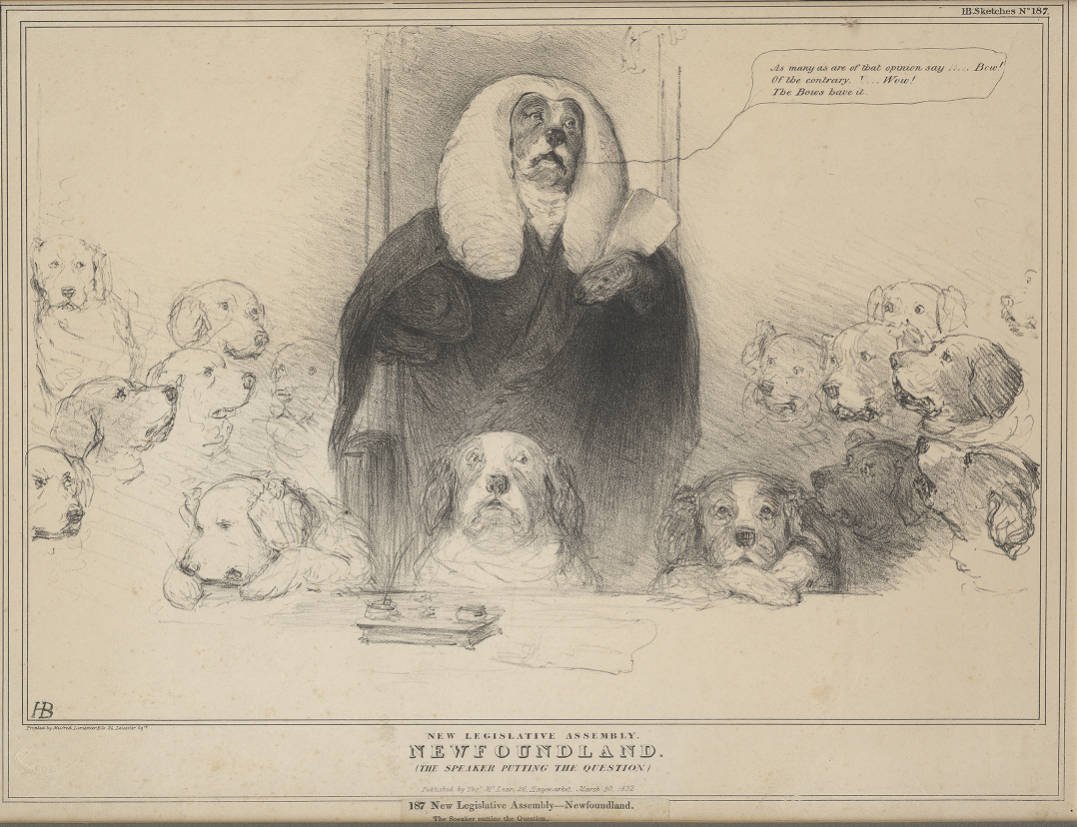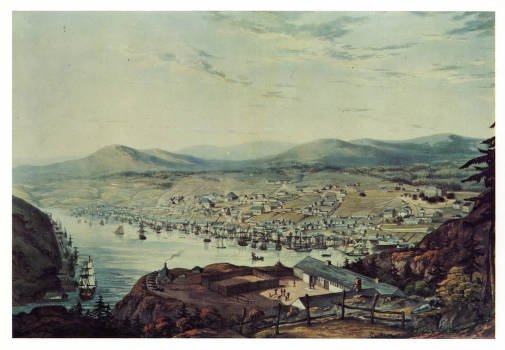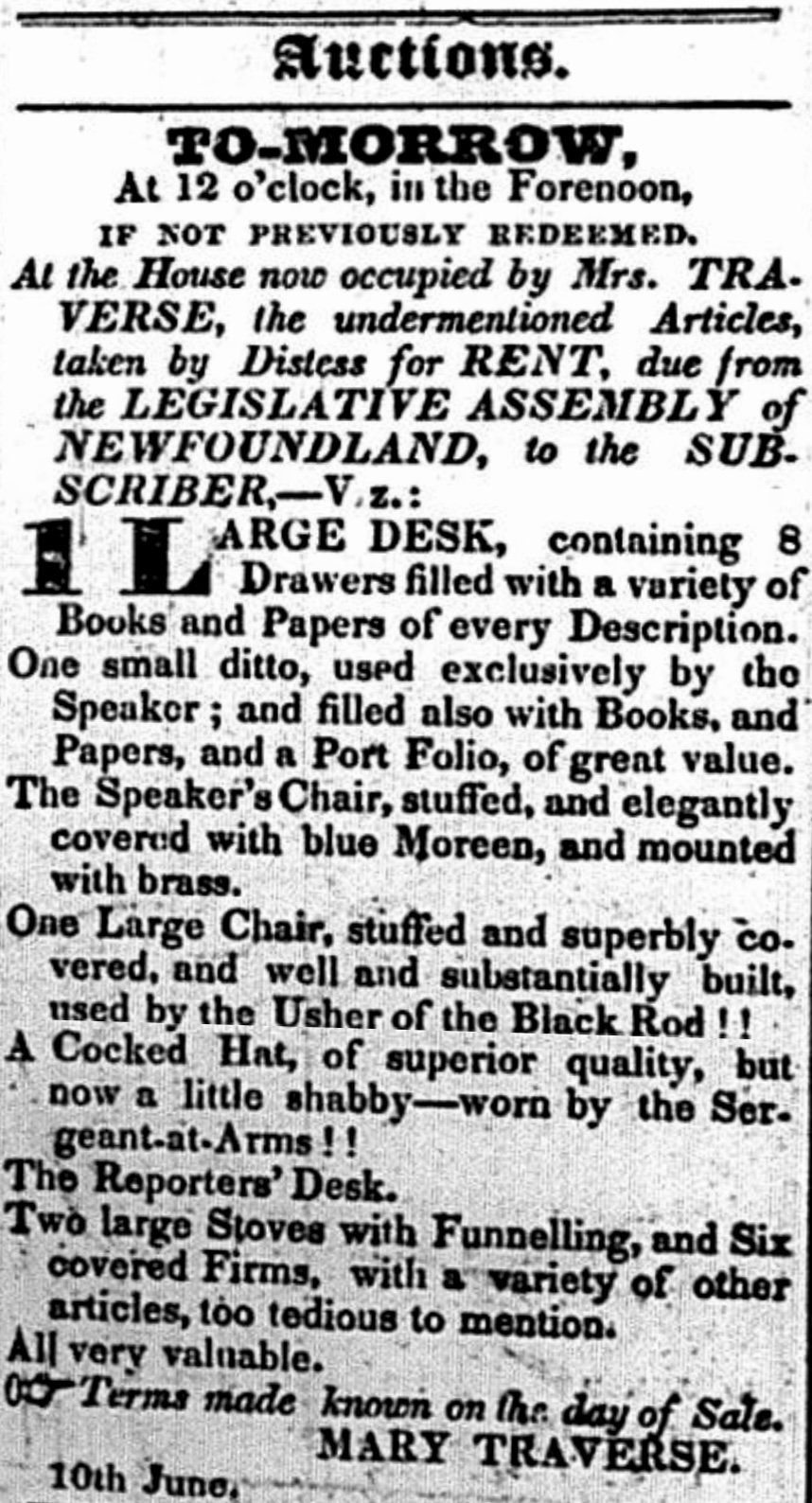Mary Travers Sells The Speaker’s Chair
It was June 10, 1834 and a shocking ad had just appeared in the local press — the furniture and belongings of the Newfoundland Legislature were up for sale. The speaker’s chair, ‘books and papers of every description,’ even the Sergeant-at-Arms hat were about to be auctioned to the highest bidder.
The government wasn’t spring cleaning; they hadn’t even placed the ad. The truth is the auction was an angry swipe at a fledgling legislature that had failed to keep its house in order.
It was a failure that came at the expense of Mary Travers, a local business owner.
Government in a Tavern
The story begins nearly two years before the auction. It even starts before Newfoundland had an elected legislature.
1832 cartoon by John Doyle inspired by the Newfoundland agitation for Representative Government. Public Domain/ MUN DAI/CNS
In September 1832 Newfoundland had just won the right to representative government; for the first time Newfoundlanders would have the chance to choose their own leaders.
In St. John’s the elections were to be held in a two-story tavern and lodging house on the corner of King’s Road and Duckworth Street. It was a well-known business in town and regarded as “favourite gathering place of the intelligentsia.”
On September 25th fifteen members, representing nine districts, were elected.
The first order of business for the new legislature was to select a meeting space. They considered the courthouse, but it was too small.
There was an obvious, if unorthodox, second choice — the tavern on King and Duckworth. It had worked perfectly for the speeches and campaigning of the election, and had played host to meetings and clubs in town. It could easily host the legislature, if the owner was open to the idea.
Enter Mary Travers
The tavern and hotel were owned by Mrs. Mary Travers. Travers was born in 1783 to John and Mary Widdicombe of St. John’s. She married a merchant named John Travers who, according to reports, was lost at sea.
After his death, Mary supported her family through the operation of the her hotel.
When she was approached by the government to have the legislature rent her space she must have been pleased. A stable, long-term resident seemed like a great business opportunity, so Travers readily agreed.
It was a decision she would soon come to regret.
St. John’s, NL, 1831. Public domain/MUN DAI, CNS
The First Session of the House
Travers began preparations to host the legislature on December 26, 1832 and on January 1st the representatives sat for their first session. They continued to use the space until well into the summer.
Throughout all the legislative business, Travers was spending money. She had to heat her hotel and hire additional staff to meet her new tenant’s demands. On top of that, she lost her usual income. Because her space was being monopolized by the legislature, she had to turn away her usual customers.
All of that would have been fine — if the government hadn’t skipped out on its tab.
Mary Travers Wants Her Money
By March of 1833 — three months into the legislature’s occupation of her hotel — Mary had not been paid. Nor had she been paid for the use of her establishment during the election. On March 20, she formally petitioned the legislature “praying remuneration” for the election.
An agreement was reached to deliver the money but, somehow, no cash made it to Travers’ pocket.
“I look for nothing but my agreement—I ask nothing more and I think every individual ought to get that. And if my agreement is honourable, is it not cruel to withhold it, and drive me to beggery and distress?”
On July 26 she had to petition the house again. This time she sought rent for the use of her hotel as the legislature and to remind them she had yet to receive the money ordered to her for the election.
Things were getting dire for Travers —she was out of money and her creditors were threatening law suits.
The government was turning into a terrible tenant.
After fighting tooth and nail with colonial administration, Travers managed to get the rent she was owed for the period from December 26 to July — no small victory.
Travers still had a problem, though. Her business continued to be occupied by the legislature. Their furniture, papers and belongings filled her rooms so her hotel could not accept guests and, though the back rent had been paid, the government had no immediate plans to pay for their current occupancy.
Travers Takes Control
Mary Travers went to court and got an order barring the legislature from her building. She had a warrant issued allowing her to seize the government’s property on her premises.
At this point, I don’t imagine Travers planned to sell the legislature’s belongings. I think she was attempting to get the attention of the government and give herself a bargaining chip.
She certainly succeeded on the first count — the government noticed. In February 1834 she was summoned to appear at the legislature. They demanded the return of their property. Travers stood her ground — she refused to return any items until she was paid.
Ad placed by Mary Travers in The Patriot, May 13, 1834. Creative Commons, MUN DAI
Arbitration was suggested.
The government promised they would pay Travers whatever the arbitrators deemed fair if, and only if, she would return their belongings.
Travers was willing but only if they allowed her a copy of the agreement.
For some reason, her request was denied.
Understandably, Travers was not inclined to take the government at its word so, she refused to release their things.
By May, Travers knew she had to get her business running again. She placed ads in local newspapers advising the public that, with the government locked out of her hotel, her premises were once again available to the public.
Ad placed by Mary Travers in The Patriot, June 10, 1834. Creative Commons, MUN DAI
To make space for travellers, the government’s gear had to go.
On June 10, 1834 Travers posted an ad advising there would be an auction the next day of the government’s property, “if not previously redeemed.”
More than just an ad, it was a final entreaty to the legislature to make things right but the government was unmoved.
The auction went ahead as scheduled. The nearly-new speaker’s chair and the rest of the government’s belongings were sold… for a total of £20.
As might be imagined, the people of the colony were less-than impressed. It was Travers that many sided with, choosing to see the government as untrustworthy and responsible for the near financial ruin of a well-know local widow.
The Patriot offered a public rebuke:
“The Executive and Assembly have taken wonderful pains, in the cause of this poor widow, to make for themselves a monument of degradation and eternal disgrace... The only moral that can be gathered from this species of swindling is, that it should put people on their guard against those that contract in the name of the Government...”
Recovering The Furniture
The government eventually recovered the auctioned materials. Numerous sources indicate they were retrieved from a ‘Mr. Leary.’ None of the sources supply any information on the circumstance.
I think there must be a tale or two to tell here… and I’m curious.
The Fate of Mary Travers
Travers continued to operate her hotel until 1846 when it was destroyed by the great fire. After that she moved to Kildare, Prince Edward Island.
Despite leaving the island, Travers never relented in her fight against the Newfoundland government — even in death.
On April 18, 1854 —more than 20 years after the government started renting her hotel — a petition written by Travers was read in the legislature. It described “the great straits to which she has been reduced by the Government of Newfoundland,” and asked “for arrears of rent due since 1833.”
But, as was always the case for Travers, the government had moved too slowly.
Mary Travers had died on February 23rd, 1854 — nearly two months before the petition was read.
She never saw her money.
-
Interesting Speech, Western Star, 1933
She Seized The Speaker’s Chair!, Atlantic Guardian
The Barrelman, Daily News, 1968
Hundredth Anniversary, Daily News, Dec 31, 1932
The Patriot, June 10, 1834.
The Patriot, May 13, 1834
The Patriot, June 24, 1843







On a quiet Sunday morning in 1978, a deafening explosion shattered the calm of Bell Island, shaking homes, blasting holes in the ground, and leaving behind a mystery that still echoes today.